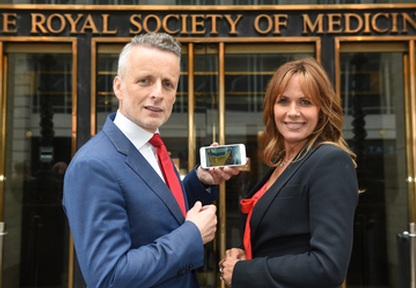Innovative care home surveillance system triggers live alerts of unusual activity
The former boss of celebrity rehab clinic, the Priory Group, has launched a new sound and motion camera surveillance system which triggers live alerts of any unusual activity.

The alerts are forwarded onto experts who have relevant high level experience in the health or social care sector and are licensed by the Security Industry Authority (SIA). After viewing the alerts they will then determine what kind of intervention to take.
The technology, which was successfully trialled in Birmingham, was launched at the Royal Society of Medicine.
Philip Scott, the former chief executive of the Priory Group, who founded the system Care Protect, said: “This innovative service model combines surveillance capabilities with third party monitoring by a team who have expert understanding of health & social care. By adopting a transparent and independent review of images that may constitute ‘incidents’, the wellbeing of adults and children is improved and they are better safeguarded and protected.”
He added: “The independence of the fully SIA licensed Care Protect monitors is crucial and their ability to escalate concerns to appropriate national and local governing bodies ensures no image can ever be suppressed or hidden. This will contribute to the raising of standards and lead to greater confidence among service users and their families. It also has the added advantage of protecting high quality providers and their staff against erroneous claims as well as speeding up any investigation process.”
The system is designed for relatives and guardians of care home residents, rather than care providers.
They will get a live feed of the resident’s room which can be viewed on smart phones, tablets or desktop computers.
If a resident does not want their room to be filmed, the technology exists to switch off the service in one location.
Key findings from the trial, which took place in a care home in Birmingham, have shaped the service with 95 per cent of relatives supporting the system use and local care commissioners satisfied with the privacy and dignity safeguards.
Staff and unions accepted the way the service operated and staff care delivery improved as a result of target training after the footage was viewed.
The organisation and its advisers, in developing this concept, have taken account of the various legislation surrounding data protection and filming. This includes the Data Protection Act 1998, the Surveillance Camera Code of Practice pursuant to the Protection of Freedoms Act 2012, issued by the Home Office, and CQC’s February 2015 guidelines.
Latest News
 29-Jul-24
Dementia Bus gives carehome.co.uk staff insight into life with dementia
29-Jul-24
Dementia Bus gives carehome.co.uk staff insight into life with dementia
 01-Mar-24
Find out the top care homes in 2024
01-Mar-24
Find out the top care homes in 2024
 21-Mar-23
UK's top care homes in 2023 revealed
21-Mar-23
UK's top care homes in 2023 revealed
 03-Jan-23
carehome.co.uk launches free care helpline
03-Jan-23
carehome.co.uk launches free care helpline
 13-Dec-22
5 mins with Emily Whitehurst, chief operating officer for Constantia Healthcare
13-Dec-22
5 mins with Emily Whitehurst, chief operating officer for Constantia Healthcare